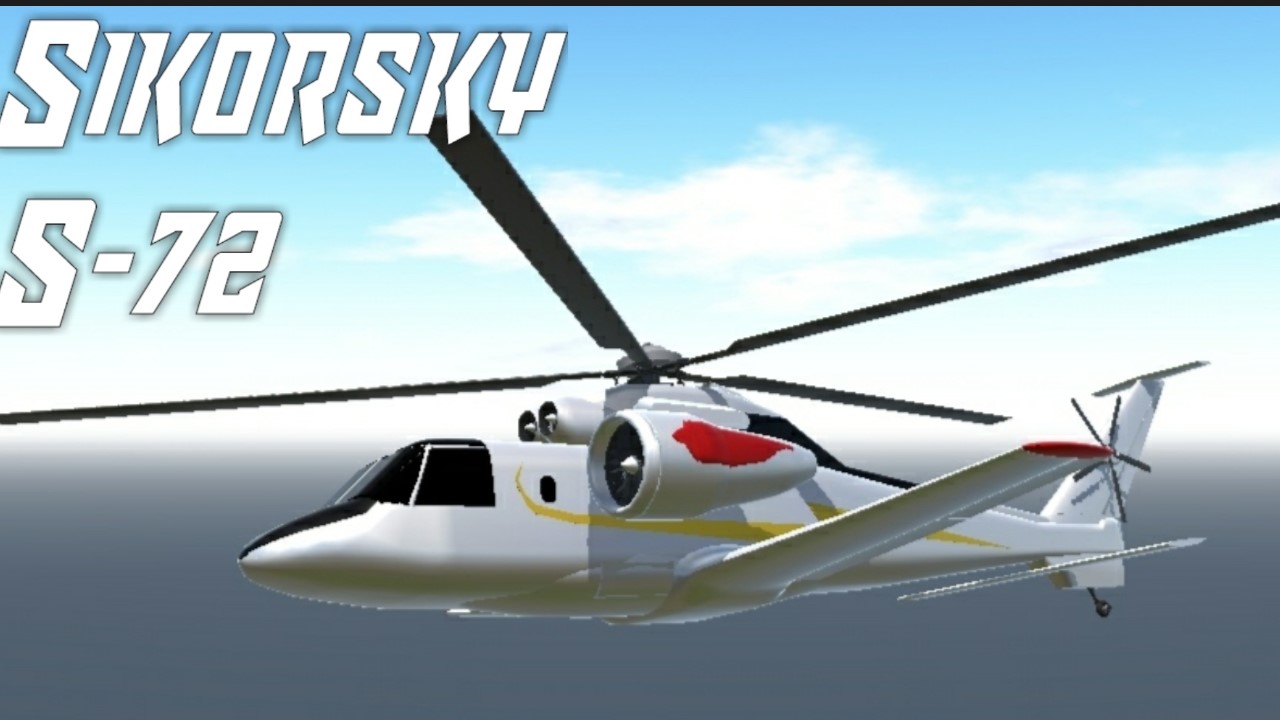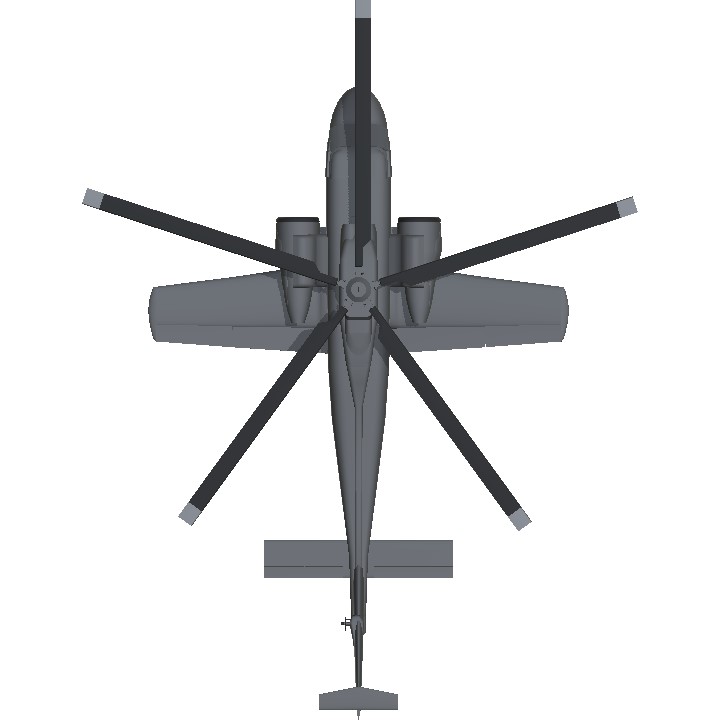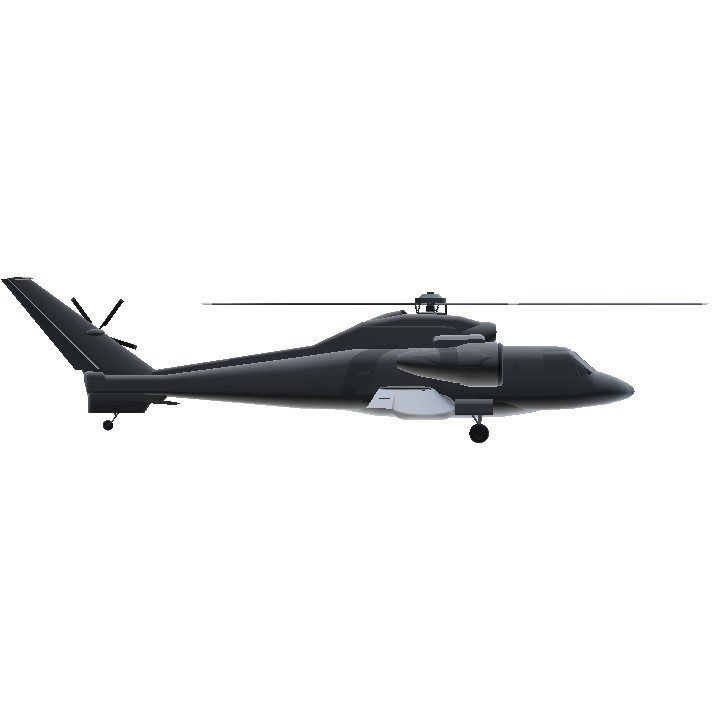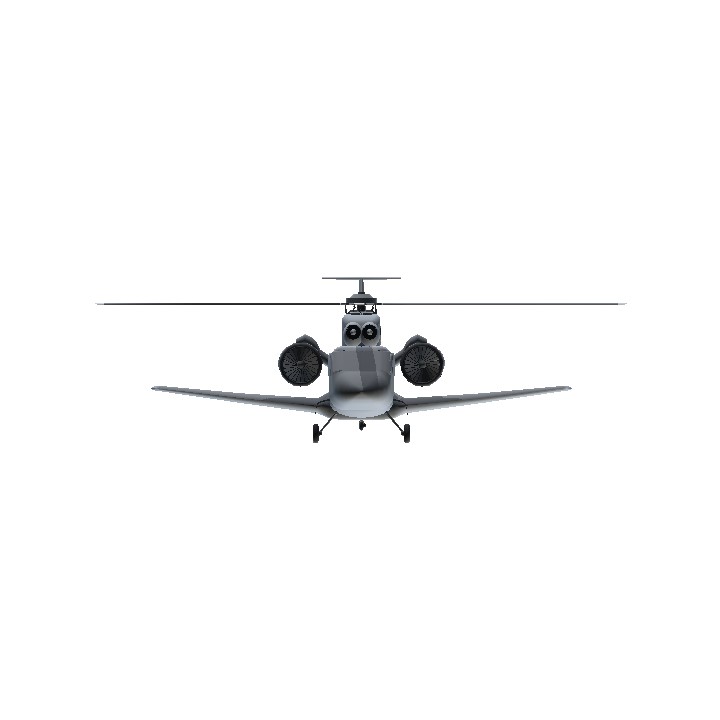Sikorsky S-72
RSRA
The Rotor Systems Research Aircraft (RSRA) was developed by Sikorsky for NASA and the Army. The RSRA was developed to allow the inflight measurement of helicopter rotor characteristics. The airframe was developed using an existing Sikorsky S-61 main rotor, an S-61 roller gearbox, and a highly modified Sikorsky S-67 airframe. The RSRA could be fitted with TF34 turbofans and wings to allow compound helicopter configurations to be experimentally investigated at speeds up to 300 knots (560 km/h). In addition, it could fly as a fixed-wing aircraft without a rotor.
Unique among helicopters of its time, it was fitted with a crew emergency extraction system. This system, when activated, fired explosive bolts that severed the main rotor blades, escape panels were blown off the roof of the aircraft, then the crew was extracted using rockets.
The RSRA was a unique pure research aircraft developed to fill the void between design analysis, wind tunnel testing, and flight results of rotor aircraft. The joint NASA/Army project began in December 1970, first flight on October 12, 1976 with the first of two aircraft arriving from Sikorsky to NASA on February 11, 1979.
One notable test performed with the RSRA was the use of the main and tail rotor load measurement system to determine the vertical drag of the airframe.
In 1981, NASA and the US Army solicited proposals for fitting a four-bladed main rotor to the RSRA. Sikorsky proposed fitting a UH-60A main rotor to the RSRA in their proposal, while Hughes Helicopters proposed fitting a YAH-64A main rotor and Boeing Vertol proposed fitting a YUH-61A or Model 347 (four-blade CH-47) main rotor. In the end, this program did not proceed.
Controls:
-VTOL UP : ROTOR POWER
-VTOL DOWN : FLAPS
-TRIM UP : COLLECTIVE ROTOR BLADE PITCH
-THROTTLE : JET ENGINE POWER
-AG8 : GYROSCOPE
HELI MODE :
TURN VTOL UP, THEN TURN TRIM UP
PLANE MODE :
TAKEOFF = VTOL DOWN 50% POWER THROTTLE 100% PULL UP WHEN REAR LANDING GEAR RISE UP FROM GROUND
LANDING = VTOL DOWN 100% POWER THROTTLE 42%
ENJOY!
M.F.
Specifications
Spotlights
- AWESOMENESS360 4.5 years ago
General Characteristics
- Successors 3 airplane(s)
- Created On Android
- Wingspan 60.2ft (18.3m)
- Length 77.9ft (23.7m)
- Height 18.0ft (5.5m)
- Empty Weight N/A
- Loaded Weight 19,718lbs (8,943kg)
Performance
- Power/Weight Ratio 17.095
- Wing Loading 43.9lbs/ft2 (214.4kg/m2)
- Wing Area 449.1ft2 (41.7m2)
- Drag Points 15617
Parts
- Number of Parts 237
- Control Surfaces 5
- Performance Cost 1,152





Yeah it is really good
Looks and flies great! I really like it
@Suubk27 wowowowwow chill...
This one is a lot of fun to play with. Will be using it a lot. Thanks and awesome job.
nice plane, finally someone else made a helicopter variation!
The missile knows where it is at all times. It knows this because it knows where it isn't. By subtracting where it is from where it isn't, or where it isn't from where it is (whichever is greater), it obtains a difference, or deviation. The guidance subsystem uses deviations to generate corrective commands to drive the missile from a position where it is to a position where it isn't, and arriving at a position where it wasn't, it now is. Consequently, the position where it is, is now the position that it wasn't, and it follows that the position that it was, is now the position that it isn't.
In the event that the position that it is in is not the position that it wasn't, the system has acquired a variation, the variation being the difference between where the missile is, and where it wasn't. If variation is considered to be a significant factor, it too may be corrected by the GEA. However, the missile must also know where it was.
The missile guidance computer scenario works as follows. Because a variation has modified some of the information the missile has obtained, it is not sure just where it is. However, it is sure where it isn't, within reason, and it knows where it was. It now subtracts where it should be from where it wasn't, or vice-versa, and by differentiating this from the algebraic sum of where it shouldn't be, and where it was, it is able to obtain the deviation and its variation, which is called error.
@MobileMobileTheFriendly i thought your gonna make the a340
@Nerfaddict no, he just say Indonesian
@Sultansyarif123 what?
Beautiful.
someone finally made it!
I just googled it.
It exists.
Nice
@MobileMobileTheFriendly udah saya download bang yg itu, terus saya kasih senjatanya tpi ga bisa gerak bang senjatanya
@Sultansyarif123 sebenarnya C-130 udah dibikin DISINI namun ini versi Military Transport(C-130), bukan versi Gunship(AC-130)
@MobileMobileTheFriendly bang bisa bikin ac 130 ghost rider ga bang?
@Sultansyarif123 Tengkyu
Mantap bang
@XAircraftManufacturer @DefinitelyNotAnFBI don't do like that :v
:)
@XAircraftManufacturer Amazing than ever!!!!!!!!!
Am i a plane?Or a heli?Nobody really knows.
Wow this is amazing!
@AWESOMENESS360 Thank you, and now we are have 2 X-wing on this web and 2 different model
This is so much better than my S-72, awesome job!
@DefinitelyNotAnFBI agreed, it's awesome